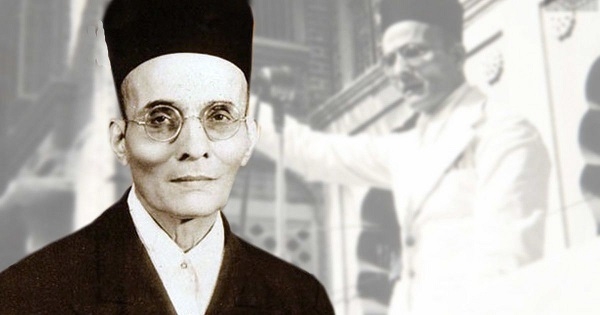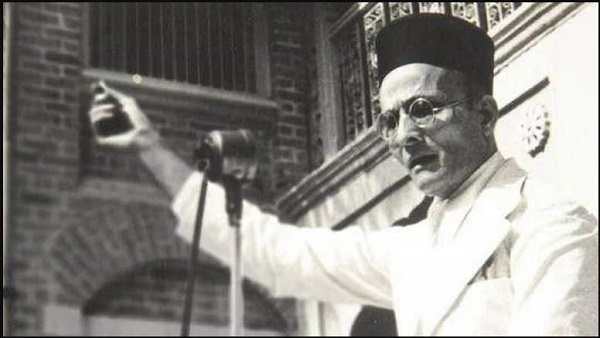Savarkar, Nazi, Hitler and Jews- Part 1
Total Views |
Savarkar opponents often spread a misconception that he was Nazi-Hitler sympathizer and advocated holocaust. So we will scrutinize his so-called ‘Nazi-Hitler Sympathizing’ statements in this article and enlighten the truth.
Savarkar and Nazi Hitler
Savarkar’s speech in Pune in front of an audience of 20 thousand, on August 1, 1938 was quoted by Marzia Casolari in article “Hindutva’s Foreign Tie-up in the 1930s Archival Evidence’’ to show that Savarkar was Nazi sympathizer- ‘’He observed India’s foreign policy must not depend on “isms”. Germany has every right to resort to Nazism and Italy to Fascism and events have justified that those ‘isms’ and forms of governments were imperative and beneficial to them under the conditions that obtained there. Bolshevism might have suited Russia and Democracy as it obtained in Britain to the British people.”….. “Who are we to dictate to Germany and Japan or Italy or Russia to choose a particular form of policy of government simply because we woo it out of academical attraction? Surely Hitler knows better than Pandit Nehru does what suits Germany best.

The very fact that Germany or Italy has so wonderfully recovered and grown so powerful as never before at the touch of Nazi or Fascist magical wand is enough to prove that those political “isms” were the most congenial tonics their health demanded. India may choose or reject particular form of government, in accordance with her political requirements. But Pandit went out of his way when he took sides in the name of all Indians against Germany or Italy. Pandit Nehru might claim to express the Congress section in India at the most.
But it should be made clear to the German, Italian, or Japanese public that crores of Hindu Sanghatanists in India whom neither Pandit Nehru nor the Congress represents, cherish no ill-will towards Germany or Italy or Japan or any other country in the world simply because they had chosen a form of government or constitutional policy which they though suited best and contributed most to their national solidarity and strength.’’ (1)
Here Savarkar is saying that it may be suitable for them under the conditions there but nowhere had he praised Nazi or Hitler. It should be noted that at the same time he also quoted Bolshevism and Democracy because these four governance systems (Nazi, Fascism, Bolshevism, and Democracy) were famous and existed in some countries of the world at that time, and so he merely quoted all of them while speaking on India’s foreign policy. It should be remembered that it was a speech on India’s foreign policy and not on which policy India should adopt. He never advocated Nazism or Fascism. There is a huge difference between stating facts and advocating them.
Since our independence, India has had very good relations with Communist Russia, Democratic USA/UK, some monarch or dictatorship Arab countries and Myanmar too, which was under Military regime till few years ago and accused of Rohigya Muslims massacre but it doesn’t affect governance systems of India viz., of a democratic and secular nation. India’s stand is of non-interference in other countries’ internal affairs. Same principle was put forth by Savarkar in same speech: ‘’The sound principle in politics lays down that no form of Government or political “isms” is absolutely good or bad under all circumstances to all people alike.’’ (2)

Above speech is already mentioned in book “Veer Savarkar’s Whirl-Wind Propaganda’’. But Marzia quoted from ‘Savarkar Papers’, a microfilm of Nehru Memorial Museum and Library. I am uncertain of whether above statements are missing in the concerned document or Marzia has skipped them intentionally or unintentionally. Savarkar also said-“India may choose or reject particular form of government, in accordance with her political requirements.’’ India’s relation with foreign countries depends upon our own national interest and security policies instead of choice of government of foreign countries. The following statement of Savarkar clears all these doubts - ‘’The sanest policy for us which practical politics demand is to befriend those who are likely to serve our country’s interest in spite of any ‘ism’ they follow for themselves and to befriend only so long as it serves our purpose.’’ (3)
He says further, “No academic and empty slogans of democracy or Nazism or Fascism can be the guiding principle of our foreign policy. Hindu interests alone will be our test.’’ (4). According to Savarkar, national interest was Hindu’s interest and Hindu’s interest was national interest.
References :
1. Casolari, Marzia. Hindutva’s Foreign Tie-up in the 1930s Archival Evidence, Economic and Political Weekly, 22 January 2000
2. Veer Savarkar’s Whirl-Wind Propaganda, Edited & Published by A S Bhide, 1941, Page 51
3. Samagra Savarkar Vangmay- Volume 6, Editor: S.R Date, 1963-65, Maharashtra Prantik Hindusabha Publication, Page 418
4. ibid, Page 327
(To be continued...)
Also Read :

